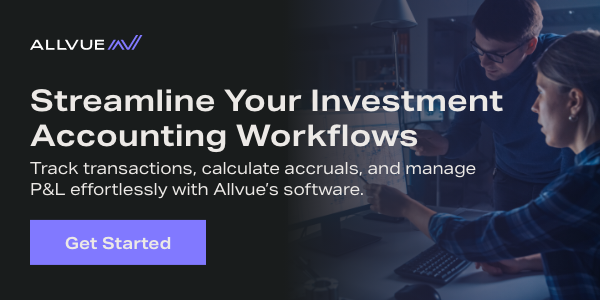
By: Kamil Godlewski
Product Manager
November 13, 2024
Multi-asset investing — as the name suggests — is one that employs multiple investment strategies — such as private equity and credit instruments — to generate returns. This strategic diversification balances risks by reducing dependence on a single investment strategy or asset class, creating a less volatile and potentially higher-return profile over time.
However, with these benefits also come the challenges of managing the complexity of multiple asset instruments. Unlike single-strategy investing, multi-asset investing must account for a variety of asset classes, each with its own unique reporting requirements, regulatory frameworks, and accounting standards. Navigating this complexity can be overwhelming for fund managers.
Luckily, there are solutions like Allvue’s Fund Accounting General Ledger for private equity and Investment Accounting subledger for debt and credit funds which can help make things easier.
In this article, we’ll explore the unique accounting challenges that funds face with multi-asset investing and show how Allvue Systems can help you navigate these challenges seamlessly to achieve accurate, transparent, and streamlined back office operations.
The challenges of managing complex assets
Managing complex assets presents several unique challenges for firms. Here’s a closer look at some of the main challenges.
Diverse asset classes
Multi-asset investing typically includes a wide range of asset classes, from equity to credit instruments.
While this diversification is beneficial for risk management, it introduces significant complexity to back office accounting. Each investment category or class has its own specific accounting requirements and standards — from asset valuation to income recognition to tax treatment.
As a result, fund managers need to juggle multiple accounting principals within a single fund. This makes it difficult to maintain consistent and accurate records across the board.
Compliance and reporting standards
Regulatory compliance and reporting is another major challenge for multi-asset investing. Different investment strategies or asset classes may be subject to varying regulatory frameworks —such as securities laws, banking regulations, commodity exchange rules, disclosure rules, jurisdictional reporting requirements and tax regulations — and specific reporting standards. This requires careful management to ensure the fund stays compliant at every level.
To complicate things further, investors in funds with multiple strategies often have specific reporting needs that must be met.
For fund managers, this results in a complex maze of compliance and reporting obligations that can be overwhelming or difficult to navigate without the right accounting systems and tools in place.
Data fragmentation
Managing diverse investment strategies also introduces the risk of data silos. This occurs when information is stored across separate systems or databases. For example, performance data for private equity might be stored or tracked in one system, while credit-related data is stored or tracked in another. This fragmentation complicates the task of gaining a unified perspective on the fund’s overall performance and risk exposure. This can hinder informed and timely decision making.
Data silos and fragmented processes also create inefficiencies in the fund accounting process. Staff may need to manually reconcile information across different systems, a time consuming and tedious task. Moreover, the manual reconciliation processes increase the likelihood of human error which can lead to inaccurate reports.
Allvue’s Fund Accounting General Ledger for private equity
Allvue’s Fund Accounting General Ledger is a powerful solution designed to simplify and streamline fund accounting processes. More specifically, it provides a centralized platform for recording, tracking, and reporting on a firm’s or fund’s private equity investments. Here are some of the standout features of this tool:
Automated fund accounting
Allvue’s General Ledger automates many of the complex calculations, allocations, and consolidations typically involved in private equity fund accounting. This automation reduces the risk of manual errors and frees up time for fund managers to focus on higher-impact tasks.
Multi-entity support
The platform supports a variety of private equity investment strategies, including venture capital, growth capital, and leveraged buyouts. This flexibility makes it especially particularly well-suited for private equity firms with diverse portfolios, enabling fund managers to more easily manage and oversee multiple investments within one unified platform.
Flexible reporting
Allvue’s system offers customizable reporting features that enable equity fund managers to generate reports tailored to the specific needs of different stakeholders such as limited partners (LPs), regulatory authorities, and auditors. Whether you need to meet specific regulatory requirements or provide investors with detailed performance insights, Allvue’s flexible reporting capabilities make it easy to generate the information you need.
Allvue’s Investment Accounting for credit investing
In addition to the Fund Accounting General Ledger, Allvue offers an Investment Accounting subledger for credit-focused investments. Here are some of the capabilities you can expect from this tool.
Accurate credit instrument tracking
The Investment Accounting subledger ensures accurate tracking of complex credit products and debt structures, including loans, bonds, and other debt instruments. It ensures that different transactions such as interest accrual and principal repayments are properly accounted for. This precision helps fund managers maintain an accurate picture of their debt and credit portfolios and enables informed decisions.
Valuation and income recognition
Accurate valuation and timely income recognition are critical for the effective management of debt and credit investments.
The Investment Accounting subledger provides tools for accurate valuation of debt and credit investments — accounting for factors like-funded vs unfunded commitments, cash vs PIK interest payments, unscheduled principal payments, varying accrual term, credit ratings, loan maturities, and interest rate changes. In addition, the subledger automates income recognition, ensuring that fund managers can consistently track and report on revenue streams with precision.
Regulatory compliance
Debt and credit-focused investments often require strict adherence to different accounting standards like ILPA reporting standards, GAAP, or IFRS. Allvue’s solution provides the tools to meet these regulatory requirements. This reduces the risk of non-compliance and at the same time enhances transparency for investors and auditors.
Why a combined approach is essential for multi-asset investing
While Allvue offers a General Ledger for private equity as a standalone solution, firms engaging in multi-asset strategies should also seek to deploy Allvue’s Investment Accounting solution to get the most value out of their accounting platform. Both systems integrate seamlessly.
Unlocking several important benefits including the following:
Unified data across asset classes
Integrating the general ledger and subledger enables fund managers to establish a unified data repository that encompasses all investments within a fund. This eliminates the need for separate platforms (that risk creating data silos) and the manual data reconciliation that often follows.
Holistic view of fund performance
Integrating Allvue’s Fund Accounting and Investment Accounting solutions provide fund managers with a holistic view of their entire portfolio, including all of their private equity, and credit investments. This consolidated view supports a more comprehensive and accurate assessment of overall performance, which in turn enables more informed decision making.
Improved efficiency and accuracy
Integrating Allvue’s solutions also enhances operational efficiency by reducing the manual effort required to reconcile data from different systems. This frees up time for fund managers to focus on high-value tasks, such as refining investment strategies or strengthening investor relationships. Moreover, with less manual input, the risk of errors decreases, leading to more accurate and reliable financial reporting.

Benefits of using Allvue for multi-asset fund and investment accounting software
Allvue’s comprehensive fund accounting and investment accounting solutions provide several valuable benefits for multi-asset investing.
Real-time reporting
Allvue’s platform delivers consolidated, accurate data across different investment strategies. This enables fund managers to make informed decisions based on a holistic view of information. As a result, managers can respond quickly to changing market conditions and capitalize on emerging investment opportunities, ultimately improving portfolio performance.
Scalability
Allvue’s fund accounting and investment accounting solutions are designed to grow alongside your fund, accommodating increasingly complex strategies and a wider array of asset classes. Whether you are adding new funds, diversifying investment strategies, or expanding into foreign markets, Allvue provides the flexibility needed to handle these changes seamlessly. You can scale your operations without having to completely overhaul your fund accounting system.
Final thoughts: Overcoming multi-asset investment accounting challenges with Allvue
Managing fund accounting for multi-asset investing that blends investment strategies like private equity and debt can be a daunting task. Allvue’s Fund Accounting for private equity and Investment Accounting subledger equips managers with the tools they need to handle multi-asset investing confidently. When used together, these tools provide a range of advantages, including unified data across asset classes, a holistic view of fund performance, improved efficiency and transparency, real-time reporting, scalability, and enhanced data accuracy and control
Explore Allvue’s Fund Accounting and Investment Accounting solutions to learn more.
Alternatively, contact us today to discuss how we can support your specific fund accounting needs.
Sources
GAAP vs IFRS: What’s the difference? https://www.investopedia.com/ask/answers/011315/what-difference-between-gaap-and-ifrs.asp
More About The Author

Kamil Godlewski
Product Manager
Kamil Godlewski is a product manager at Allvue Systems, a leading provider of investment management solutions. He has over 15 years of experience in finance and sales, working with various clients in the alternative investment space with an emphasis on private equity. He has a MBA in finance from Indiana University's Kelley School of Business and is a previous CPA license holder.



